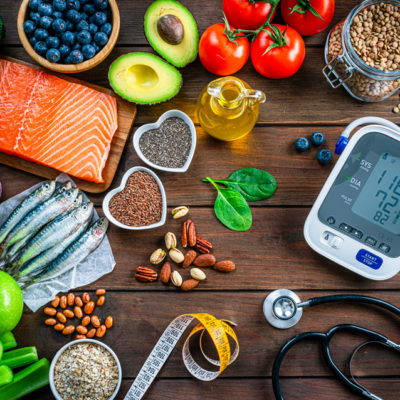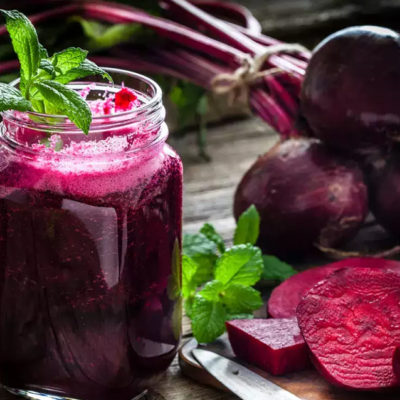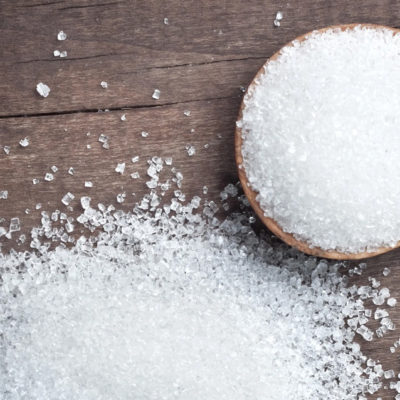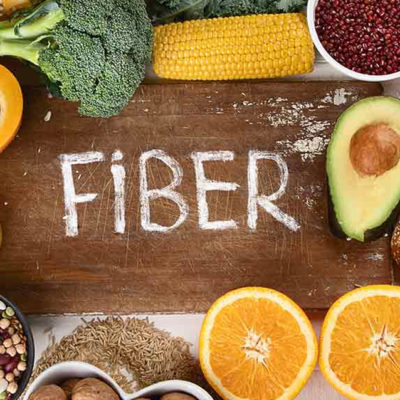Many people are keen on making healthy as well as sustainable food choices, and they often intuitively equate "healthy" with being "sustainable." A study by researchers at the University of Konstanz, the Johannes Kepler University Linz and the Hamburg University of Applied Sciences is focusing on whether or not this perception corresponds to reality. It has just been published … [Read more...]
Nutrition & Wellness

Researchers Develop New Blood Test for Measuring Levels of Critical Omega-3 Fatty Acids
Researchers at McMaster and the University of Guelph have discovered a convenient new way to track levels of omega-3 fatty acids in the bloodstream, making it much easier to access information that is critical to cardiovascular and cognitive health, but which has previously been challenging to gather. While the human body can generate most of the fats it needs, it cannot … [Read more...]
Calorie Restriction In Humans Builds Strong Muscle and Stimulates Healthy Aging Genes
Reducing overall calorie intake may rejuvenate your muscles and activate biological pathways important for good health, according to researchers at the National Institutes of Health and their colleagues. Decreasing calories without depriving the body of essential vitamins and minerals, known as calorie restriction, has long been known to delay the progression of age-related … [Read more...]
Antioxidants Stimulate Blood Flow in Tumors
Vitamin C and other antioxidants stimulate the formation of new blood vessels in lung cancer tumours, a new study from Karolinska Institutet published in The Journal of Clinical Investigation shows. The discovery corroborates the idea that dietary supplements containing antioxidants can accelerate tumour growth and metastasis. "We've found that antioxidants activate a … [Read more...]
Extreme Dietary Habits For Carbohydrates and Fats Affect Life Expectancy
A new study, published in The Journal of Nutrition, suggests that extreme dietary habits involving carbohydrates and fats affect life expectancy. Researchers from Nagoya University Graduate School of Medicine in Japan led by Dr. Takashi Tamura found that a low carbohydrate intake in men and a high carbohydrate intake in women are associated with a higher risk of all-cause and … [Read more...]
Exposure Therapy to Feared Foods may Help kids with Eating Disorders
According to the National Eating Disorders Association, approximately 30 million Americans will struggle with eating disorders, including anorexia nervosa, bulimia nervosa, binge-eating disorder and others, at some point in their lives. In addition to the LGBTQ+ community, adolescents and young adults are particularly vulnerable, and the COVID-19 pandemic didn't help. Recent … [Read more...]
How to Prevent a High-Fat Diet From Throwing Metabolism Out of Whack?
The UC Irvine research centered on a protein complex called AMPK, which senses the body's nutrition and takes action to keep it balanced. For example, if AMPK detects that glucose is low, it can boost lipid breakdown to produce energy in its place. Scientists have known that consuming high amounts of fat blocks AMPK's activity, leading the metabolism to go out of balance. … [Read more...]
Beetroot juice: Significantly Increases Muscle Force During Exercise
While it is known that dietary nitrate enhances exercise, both boosting endurance and enhancing high-intensity exercise, researchers still have much to learn about why this effect occurs, and how our bodies convert dietary nitrate that we ingest into the nitric oxide that can be used by our cells. To help close this gap, researchers at the University of Exeter and the U.S. … [Read more...]
Assessing the Risk of Excess Folic Acid Intake
"However, there is a lack of research on whether excessive folic acid intake has the potential to harm human beings," said co-corresponding author, Dr. Richard H. Finnell, William T. Butler, M.D., Distinguished Chair Professor in the Center for Precision Environmental Health and the departments of molecular and cellular biology, molecular and human genetics and medicine at … [Read more...]
Mocktails or Cocktails? Having a Sense of Purpose in Life can Keep Binge Drinking at Bay
Using functional MRI (fMRI) scanning technology, researchers from the University of Pennsylvania, Columbia University, and Dartmouth College examined the relationship between these cues, alcohol craving, and alcohol consumption. They found that having a strong sense of purpose in life decreases the temptation to consume alcohol to excess among some social drinkers. Why … [Read more...]
Body Dissatisfaction Can Lead to Eating Disorders at Any Age
Body Dissatisfaction Can Lead to Eating Disorders at Any Age ++nutrition Eating disorders are serious mental health conditions characterized by disturbances in eating behavior and body image that occur in approximately 13.1% of women across the lifespan. The prevalence of any eating disorder specifically for women aged older than 40 years is roughly 3.5%, with specific … [Read more...]
Consumption of Fast Food Linked to Liver Disease
A study from Keck Medicine of USC published today in Clinical Gastroenterology and Hepatology gives people extra motivation to reduce fast-food consumption. The study found that eating fast food is associated with nonalcoholic fatty liver disease, a potentially life-threatening condition in which fat builds up in the liver. Researchers discovered that people with obesity … [Read more...]
Better Planning, Behavior Regulation can Lead to Eating Less Fat
New research suggests coaching overweight or obese pregnant women to improve their ability to plan and make progress toward goals may be key to helping them lower the amount of fat in their diet. Maternal diet quality affects prenatal development and long-term child health outcomes, but the stress that typically increases during pregnancy -- often heightened by concern for … [Read more...]
Honey reduces cardiometabolic risks, study shows
The researchers conducted a systematic review and meta-analysis of clinical trials on honey, and found that it lowered fasting blood glucose, total and LDL or 'bad' cholesterol, triglycerides, and a marker of fatty liver disease; it also increased HDL or 'good' cholesterol, and some markers of inflammation. "These results are surprising, because honey is about 80 per cent … [Read more...]
Front-Loading Calories Early in The Day Reduces Hunger but does not Affect Weight Loss
There's the old saying in dieting that one must "breakfast like a king, lunch like a prince, and dine like a pauper," based on the belief that consuming the bulk of daily calories in the morning optimizes weight loss by burning calories more efficiently and quickly. But according to a new study publishing September 9 in Cell Metabolism, whether a person eats their largest meal … [Read more...]
Dental Biorhythm is Associated with Adolescent Weight Gain, Study Finds
An international research team led by Dr Patrick Mahoney at Kent's School of Anthropology and Conservation discovered the biorhythm in primary 'milk' molars (Retzius periodicity [RP]) is related to aspects of physical development during early adolescence. A faster dental biorhythm produced smaller gains in weight and mass. RP forms through a circadian-like process, occurring … [Read more...]
Parents Adopt Unhealthy Food Routines for Family Wellbeing in Place of Unaffordable Activities
New study study suggests a key reason parents on a low-income buy unhealthy foods for their families is to compensate for non-food related activities which support social wellbeing, but that they are unable to afford. The study from the Centre for Food Policy at City, University of London sheds light on the food buying habits of low-income parents across England. It looked … [Read more...]
Balancing Protein in Your Diet could Improve Water Quality
Protein consumption in the United States, from both plant and animal sources, ranks among the highest in the world. The study, published in the journal Frontiers in Ecology and the Environment, said that if Americans ate protein at recommended amounts, projected nitrogen excretion rates in 2055 would be 27% less than they are today despite population growth. The study is … [Read more...]
Long Term High-Fat Diet Expands Waistline And Shrinks Brain
New research shows that fatty foods may not only be adding to your waistline but also playing havoc with your brain. An international study led by UniSA neuroscientists Professor Xin-Fu Zhou and Associate Professor Larisa Bobrovskaya has established a clear link between mice fed a high-fat diet for 30 weeks, resulting in diabetes, and a subsequent deterioration in their … [Read more...]
High Fat Diet, Unregulated Athletic Exercise Endurance Enhancers Linked to Risk of Pancreatic Cancer
Researchers at the University of Michigan Rogel Cancer Center have found a cell nuclear receptor activated by high fat diets and synthetic substances in unregulated athletic performance enhancers fuels the progression of precancerous pancreas lesions into pancreatic cancer. Pancreatic ductal adenocarcinoma is a highly lethal form of cancer with rising occurrence, and … [Read more...]
Large Study in Botswana Finds Daily Micronutrient Supplementation During Pregnancy Reduces Complications at Birth
Published in Lancet Global Health, the study was led by Ellen Caniglia, ScD, an assistant professor of Epidemiology in the Department of Biostatistics, Epidemiology, and Informatics at the Perelman School of Medicine at the University of Pennsylvania, as well as investigators at the Botswana-Harvard AIDS Institute Partnership and Harvard T.H. Chan School of Public Health. The … [Read more...]
New Study Reveals that Healthy Plant-Based Diets are Associated with a Lower Risk of Developing Diabetes
The study was conducted by Professor Frank Hu and colleagues at the Department of Nutrition, Harvard T.H. Chan School of Public Health, Boston, MA, USA, and aimed to identify the metabolite profiles related to different plant-based diets and investigate possible associations between those profiles and the risk of developing T2D. A metabolite is a substance used or produced … [Read more...]
Scientists Develop Coated Probiotics that could be Effectively Delivered into the Human Gut
Probiotics are defined by the World Health Organisation as live microorganisms, which when administered in adequate amounts, confer a health benefit on the host[1]. They have been shown to help prevent infections of the urinary and digestive tracts, and to maintain a healthy gut flora, which is linked to reducing the risk of obesity and promoting overall … [Read more...]
New Clues in the Brain Linking Pain and Food
It has long been known that there is an association between food and pain, as people with chronic pain often struggle with their weight. Researchers at the Del Monte Institute for Neuroscience may have found an explanation in a new study that suggests that circuitry in the brain responsible for motivation and pleasure is impacted when someone experiences pain. "These findings … [Read more...]
Coffee and Tea Drinking may be Associated with Reduced Rates of Stroke and Dementia
Drinking coffee or tea may be associated with a lower risk of stroke and dementia, according to a study of healthy individuals aged 50-74 publishing Nov. 16 in the open-access journal PLOS Medicine. Drinking coffee was also associated with a lower risk of post-stroke dementia. Strokes are life-threatening events which cause 10 percent of deaths globally. Dementia is a … [Read more...]
For some Greenlanders, Eating Sugar is Healthy
Imagine being able to swap out broccoli for sweets, Ben & Jerry's or some other sugary treat and achieve the same health benefits. This is fact not fantasy for about two to three percent of the Greenlandic population. Two copies of a gene variant make it so that they absorb sugar differently than other people do. "Adult Greenlanders with the genetic variation have … [Read more...]
Dietary Fiber Improves Outcomes for Melanoma Patients on Immunotherapy
Melanoma patients receiving therapy that makes it easier for their immune system to kill cancer cells respond to treatment better when their diet is rich in fiber, according to a large, international research collaboration that includes the Oregon State University College of Pharmacy. Published today in Science, the study led by the University of Texas and the National … [Read more...]
Latte Lovers Rejoice! Study Reveals Drinking Coffee could Lower the Risk of Alzheimer’s Disease
Good news for those of us who can't face the day without their morning flat white: a long-term study has revealed drinking higher amounts of coffee may make you less likely to develop Alzheimer's disease. As part of the Australian Imaging, Biomarkers and Lifestyle Study of ageing, researchers from Edith Cowan University (ECU) investigated whether coffee intake affected the … [Read more...]
How Eating Less in Early Life could help with Reproduction Later on
Switching from a restricted diet to eating as much as you like could be beneficial for reproduction in later life, according to new research from the University of East Anglia. Researchers studied the eating and mating habits of the small fruit fly Drosophila melanogaster. They found that females that consumed less food for their entire lives lived longer, however they … [Read more...]
Unraveling the mystery of why we overeat
Eating is one of life's greatest pleasures, and overeating is one of life's growing problems. In 2019, researchers from The Stuber Lab at the University of Washington School of Medicine discovered that certain cells light up in obese mice and prevent signals that indicate satiety, or feeling full. Now comes a deeper dive into what role these cells play. A study … [Read more...]
- « Previous Page
- 1
- 2
- 3
- 4
- 5
- …
- 44
- Next Page »





























